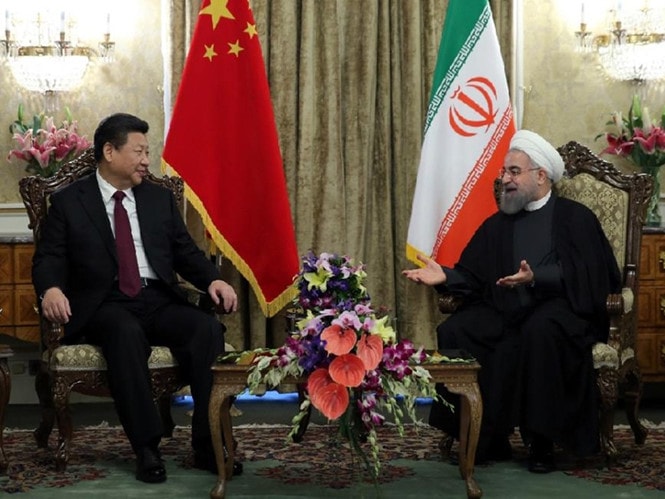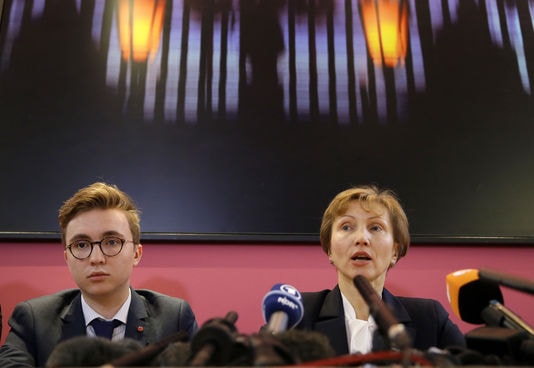Old hotspots, new factors
(Baonghean) - Besides some spontaneous events such as terrorist attacks, shootings or sinking migrant ships, the most prominent on the international news map last week were still major diplomatic and political hotspots such as the Middle East, Russia - the West. If the relationship between Russia and the West shows no signs of positive change, the Middle East chessboard is opening up new moves with the appearance of new factors...
The Middle Eastern fire pan "keeps the heat"
The heat of this “diplomatic minefield” has not shown any signs of abating and continues to be the focus of attention of forces and factions around the world. While on the other side of the Pacific, the US remains “loyal” to the “stick and carrot” tactic to deal with Iran, China has chosen a completely different path.
 |
| Chinese President Xi Jinping (left) and Iranian President Hassan Rouhani before a meeting in Tehran - Photo: AFP |
On January 19, Chinese President Xi Jinping made his first official visit since taking office to three Middle Eastern countries, including Saudi Arabia, Egypt and Iran. Notably, two-thirds of the Chinese leader's stops were the "main actors" of the fierce confrontation that is emerging as a new hot spot in the region, alongside the Syrian civil war and the expansion of terrorism.
This seems to be a confusing and questionable “double-dealing” move, as Middle Eastern countries are traditionally extremely suspicious and tough diplomatic partners. What makes China confident that it can manage the relationship between two long-time enemies, especially at such a sensitive time?
Discussing the complicated relationship between Saudi Arabia and Iran, both are countries with great military and economic potential in the region, and both have a foundation of abundant oil resources. However, while Saudi Arabia has been a close ally of the West, especially the US, for many years, Iran has just emerged from a period of embargo and prolonged isolation due to its much-criticized nuclear program. Or at least that is in theory - because most recently, despite having just announced the lifting of sanctions imposed on Tehran and the settlement of disputes related to Iranian assets frozen since 1979, Washington has "rushed" to impose new sanctions on the Middle Eastern country.
A move that Iran considers to be a manifestation of the US's "deceitful" attitude, as it seeks to delay sanctions to reach agreements that are favorable to it. Of course, the US's "both-punishing and-comforting" attitude towards Iran is also the result of many conflicting opinions in the US on the Tehran nuclear issue. In short, it must be affirmed that the US does not completely trust Iran and similarly, Iran is not very satisfied with the US's rapid change. However, the US's behavior inevitably raises many doubts about its effectiveness because its ally Saudi Arabia has shown "displeasure", especially after the historic nuclear agreement was signed. Will the US be able to maintain its dominance over both sides, or will it "fail the rice and burn the rice"?
Meanwhile, China's move is somewhat wise in choosing to approach from the economic field. Firstly, this is also the top goal that China seeks to boost its economy, which is slowing down and showing signs of decline. In the context of energy having a clear influence on the world economic situation, there is no reason for China to continue to ignore the Middle East, which is rich in energy resources. That is also one of the main reasons "holding back" the US and the West in this complicated land, evidenced by the establishment of an alliance very early with Saudi Arabia - one of the "big guys" in oil in the region. Secondly, China certainly wants to increase its influence in the Middle East in a comprehensive way, but given the current political and military context, economics is a much safer and "more open" move.
Another reason for China to “jump into” the Middle East chessboard, specifically the tense relationship between Saudi Arabia and Iran at this time, is likely to be to guard against the risk of religious extremist ideology being “exported” out of the region, creating a favorable environment for groups with ideologies opposing the Beijing government to operate.
Russia continues to be "estranged" from the West
The broken relationship between Russia and the West will probably not improve in the near future, as Western countries continue to have unfriendly actions towards the birch country.
 |
| The son and wife of former spy Alexandre Litvinenko at a press conference on January 21, 2016, London. Photo: AP |
On Thursday, January 21, a “diplomatic storm” broke out between London and Moscow when British Judge Robert Owen concluded that the Russian government and President Vladimir Putin were involved in the 2006 murder of former Russian intelligence agent Alexandre Litvinenko. Mr. Litvinenko was poisoned with Polonium 210, a highly toxic and virtually undetectable radioactive substance.
The judge concluded that “the task carried out by the FSB (Russian secret intelligence agency - the “successor” of the KGB) was approved by former FSB Director Nikolai Patrouchev and President Putin”. In response, Moscow said this was just a “joke”.
However, it seems that London has no intention of playing with the Russian "bear" when summoning the Russian Ambassador to the UK and British Home Secretary Theresa May, and at the same time announcing the freezing of the assets of the two subjects who are believed to have directly carried out the poisoning. These two characters had tea with Mr. Litvinenko at the Millennium Hotel on the afternoon of November 1, 2006. That same evening, he showed signs of being unwell and died 3 weeks later. Litvinenko had taken refuge in the UK since 2000 and was considered a traitor by the FSB for his involvement in investigating the links between the Kremlin and mafia networks. He also cooperated with British intelligence agencies and was granted British citizenship.
Commenting on the latest British statements, Russian President's office spokesman Dmitri Peskov said the move "further worsened bilateral relations" between the two sides but also showed that the Kremlin was not too concerned about the incident.
In another development, the US government on January 22 announced that it would not recognize five of the six honorary consuls of Russia in the US, citing Russia’s actions to obstruct Washington’s diplomatic and consular activities in Russia. One of the actions cited by the US was the closure of the American Center in Moscow in September 2015.
In contrast to the case involving the British judge’s ruling, this move was immediately protested by Russia. A spokesman for the Russian Foreign Ministry accused the US of “provoking” Russian diplomats – a new measure to isolate Russia on the international stage?
Thuc Anh
(According to Le Monde)
| RELATED NEWS |
|---|
